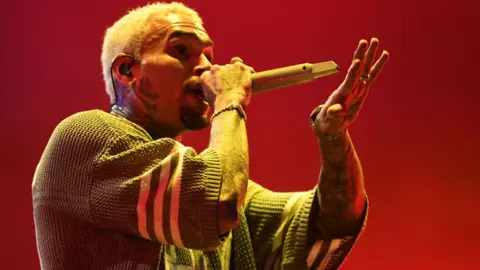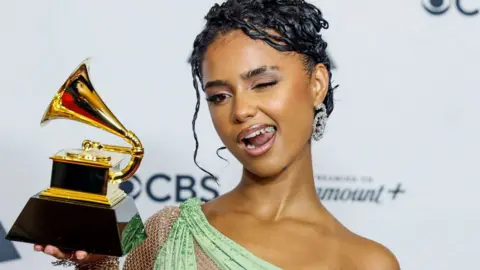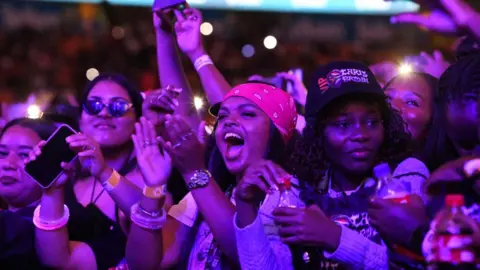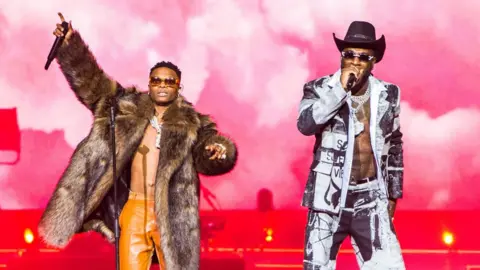 Getty Images
Getty ImagesThe Grammy Awards has a dedicated space for African music, but just a year after the category’s introduction it is already proving contentious.
The Best African Music Performance made its debut with South Africa’s Tyla winning for her hit song Water, a blend of South African amapiano and Afropop.
It was a move welcomed across the industry, especially by African artists.
But the nominations for this year’s award have raised eyebrows, especially with the inclusion of US R&B star Chris Brown.
The 35-year-old has been nominated for his chart-topping single Sensational, which incorporates Afrobeats elements and features guest vocals from Nigerian artists Davido and Lojay.
However, the participation of an American artist in an African music category has sparked some debate.
Should non-African artists be considered in a category meant to showcase African talent?
“Music is about inclusivity. We don’t want to fence people out of genres,” Grammy CEO Harvey Mason Jr tells the BBC.
“If we start deciding who can or can’t make a certain type of music, we lose the essence of creativity.”
The head of the Grammys explains that such cross-fertilisation is expected.
“We’ve seen it with Latin before, we’ve seen it with K-Pop and now you’re starting to see it with Afrobeats and amapiano,” he says.
“We like to honour all music [regardless of] where it comes from or who makes it. If it’s excellent we want to celebrate it.”
Another bone of contention this year is the dominance of Afrobeats, which has its roots in Nigeria and Ghana.
There is a feeling that the Grammys remain too focused on it, to the exclusion of other African music genres, despite calls for inclusivity.
Nigerian music journalist Ayomide Tayo says he understands why Afrobeats is dominating this year’s awards.
“I don’t think Afrobeats is better,” he tells the BBC.
“It’s just that Afrobeats has had over three decades of exposure. We consistently pushed great music, superstars and events that have attracted the world to it,” Lagos-based Tayo explains.
Nigerians living abroad have also played a crucial role in the popularisation of Afrobeats.
“The Nigerian diaspora in England and North America is one of the key factors why Afrobeats exploded in Europe and the US,” Tayo says.
While other Africa-based music business professionals see a bright future for other African music genres, saying this year could be a one-off.
 Getty Images
Getty ImagesFor example, amapiano, a genre that in 2023 surpassed 1.4 billion streams on the music app Spotify.
Raphael Benza, head of Johannesburg-based record label Vth Season, says the very name Best African Performance goes against pigeonholing.
“Coming from the home of amapiano, I would say [musicians] are doing extremely good work and I think next year you’ll see amapiano artists being nominated in this category,” he tells the BBC.
The Best African Music Performance category was introduced as a way to honour Africa’s increasing influence on global music.
When Tyla won, she beat Nigerian heavyweights like Davido and Burna Boy, establishing her place on the international stage.
Since then, the 22-year-old has been spotted at the Met Gala in New York and has been featured in top fashion magazines, proving that the Grammys effect is real.
This year’s nominees, however, have shifted almost entirely to Nigerian artists, with Yemi Alade, Burna Boy, Tems and a joint nomination for Asake & Wizkid, as well as Davido and Lojay featuring on Chris Brown’s hit.
 Getty Images
Getty Images“To be fair to Chris Brown, he has been invested in Afrobeats and African music for a long time,” says Tayo, explaining that the US musician flew to Nigeria to collaborate with Davido and Wizkid.
“We have an inside joke in Nigeria that we say Chris Brown is Nigerian, because of the ways he pops up in our songs and our music videos all the time.”
Last month, he also held two massive sell-out concerts at a 90,000-seater stadium in Johannesburg – with people travelling from across southern Africa to see his performance, which fans said was electrifying.
African musicians have won Grammys long before the Best African Music Performance Award was established.
South Africa’s Mariam Makeba was the first to win one – Best Folk Recording – in 1966 for her collaboration with Harry Belafonte, called simply An Evening with Belafonte/Makeba.
 Getty Images
Getty ImagesAfrican artists became more of a feature after 1992, with the introduction of the Best World Music Album.
That category has gone through various guises over the years – including being split into traditional and contemporary world music awards – and is now known as Best Global Music Album.
Multi-award winners include Angélique Kidjo, Youssou N’Dour, Ali Farka Touré and Ladysmith Black Mambazo.
But African musicians have often broken out of that category for example, South Africa’s Black Coffee won Best Dance/Electronic Album in 2022.
The hope is that to counter the dominance of Afrobeats, more categories from Africa will be offered at the Grammys in years to come.
This would cover the ever-growing popularity of African music globally – and better reflect the huge number of music styles produced in Africa.
You may also be interested in:
 Getty Images/BBC
Getty Images/BBC


